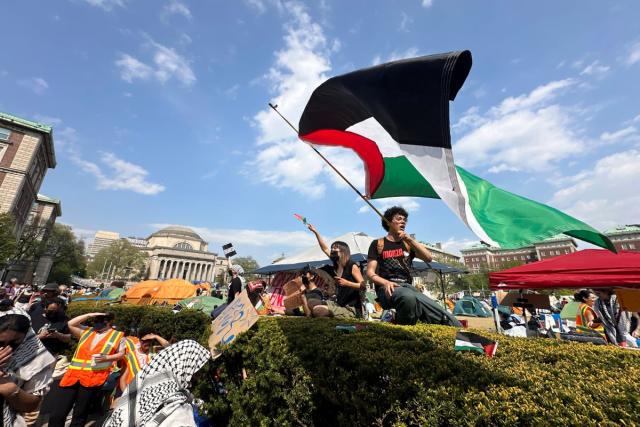After weeks of pro-Palestinian demonstrations rocked the Ivy League university’s campus, Columbia University postponed its main graduation ceremony. However, the institution will still host smaller, school-based ceremonies.
A spokesman for Columbia University, Ben Chang, stated, “Holding a large commencement ceremony on our campus presented security concerns that unfortunately proved insurmountable.” “Like our students, we are deeply disappointed with this outcome.” May 15 had been the scheduled date of graduation.
According to Chang, the institution looked for a different location but was unable to locate one big enough to hold the over 50,000 students, family, and visitors that usually attend.
Similar protests at several institutions across the nation have been sparked by the Columbia University demonstrations, which garnered national notice. Students have asked that their schools divest from businesses that have ties to Israel and have called for a ceasefire in Gaza.
Although Israel claimed the parameters did not fulfill its demands, the militant Palestinian group Hamas accepted a proposal from mediators for a ceasefire in Gaza and proceeded with strikes in Rafah, intending to continue negotiations towards a compromise.
Health officials in the Palestinian enclave run by Hamas claim that over 34,600 Palestinians have lost their lives as a result of Israel’s military operations in Gaza throughout the conflict, which has lasted for seven months.
According to Israeli estimates, the conflict started on October 7 when Hamas militants assaulted Israel, killing over 1,200 people and kidnapping 252 more, of whom 133 are said to be in captivity in Gaza.
Citing a critical need for campus safety, a number of American colleges, including Columbia, dispatched riot police armed with batons and flash-bang grenades to disperse and apprehend hundreds of demonstrators as the rallies gained momentum. Civil rights organizations have denounced these strategies as needlessly violent violations of the right to free speech.
Colleges throughout the country have had to move, alter, or postpone commencement ceremonies due to the unrest on campus. One week after canceling a Muslim student’s valedictorian speech because she felt stifled by anti-Palestinian bigotry, the University of Southern California likewise canceled its main-stage ceremony.
Columbia claimed that in order to decide how to manage graduation, it had conferred with student leaders. The main sporting complex, located approximately five miles (8 km) away, will host the majority of the smaller ceremonies that were originally scheduled to take place on the university’s upper Manhattan campus, the site of most demonstrations.
First of Three Items On May 7, 2024, in New York City, United States, Columbia University students demonstrate outside the homes of University Trustees as part of continuous demonstrations in favor of Palestinians amid the ongoing conflict between Israel and the Palestinian Islamist organization Hamas.
About 200 pro-Israeli protestors held their own demonstration on Monday, a block from school, to honor the Holocaust and condemn what they perceive to be antisemitic and anti-Jewish abuse stemming from college rallies.
“We are aware that there is evil in the world and that some people are capable of heinous and horrifying acts. However, how can we make sense of the reaction of an excessive number of individuals, including members of the so-called elite and Ivy League colleges?” The Israeli American Council’s CEO, Elan Carr, addressed the protest.
Pro-Palestinian demonstrators marched on the Met Gala, a glamorous event that benefits the New York Metropolitan Museum of Art, across town. Numerous arrests were made, according to the police, but no injuries were reported.
In a divisive U.S. election year, where Democratic President Joe Biden and Republican Former President Donald Trump are vying for the White House again, the protests have turned into a political hotspot.
PROTESTING JEWISH STUDENTS AND ISRAEL
Speaker of the US House of Representatives Mike Johnson, a Republican, chastised Columbia’s administrators on Monday, saying that the decision to postpone commencement prevented thousands of graduates from receiving the recognition they merited. Johnson had previously criticized the university’s administration for allegedly being too forgiving of protestors during a campus visit in April.
Johnson said that the cancellation demonstrated her preference to “give control to Hamas supporters rather than restore order,” and she urged the board of trustees to fire university president Minouche Shafik.
After pro-Palestinian demonstrators besieged a Columbia building last week, New York City police cleaned it out, making over 100 arrests on and around campus, and breaking up an encampment.
This week, several American universities are still debating how to get rid of protestors off their campuses.
At the Massachusetts Institute of Technology in Cambridge, Massachusetts, protesters mostly dismantled a pro-Palestinian camp after administrators threatened to suspend them immediately if they stayed.
The order to vacate was announced by MIT President Sally Kornbluth in a statement. “Given developments over the past several days, I must now take action to bring closure to a situation that has disrupted our campus for more than two weeks,” Kornbluth said.
However, hundreds more demonstrators reappeared later on Monday night, tearing down the police barricades that surrounded the camp and exchanging gunfire.
Interim President Alan Garber of neighboring Harvard University announced on Monday that protestors who persisted in their two-week-old encampment would be sent for “involuntary leave,” which would prevent them from taking examinations, living in Harvard dorms, or being on campus until they were allowed to return.


Comments are closed, but trackbacks and pingbacks are open.